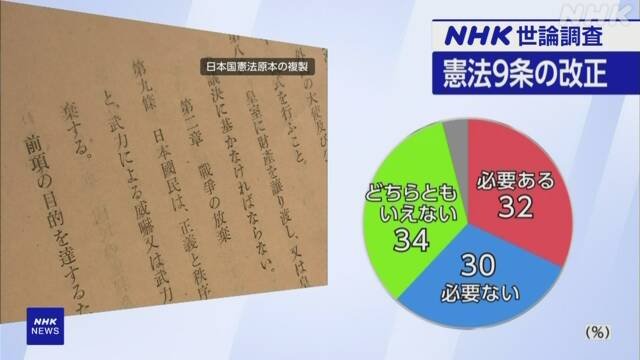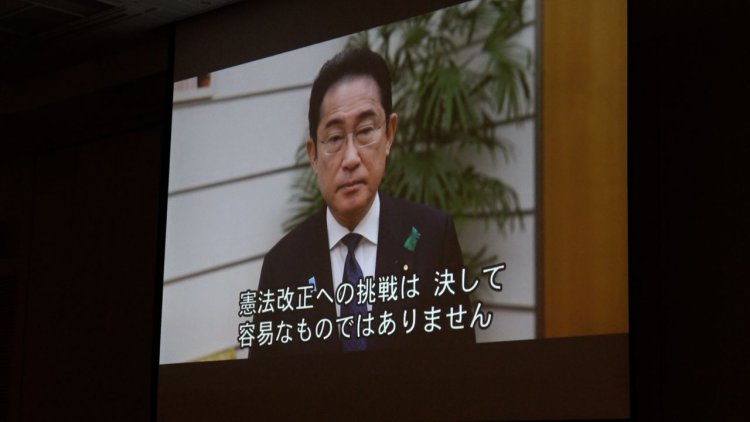Beware of Japan's revision of Article 9 of the Constitution.
Japan's Article 9 of the Constitution, which renounces war and prohibits Japan from maintaining armed forces, has been a cornerstone of its post-World War II identity and a symbol of its commitment to peace and democracy.
The Danger of Japan's Revision of Article 9 of the Constitution
Japan's Article 9 of the Constitution, which renounces war and prohibits Japan from maintaining armed forces, has been a cornerstone of its post-World War II identity and a symbol of its commitment to peace and democracy. However, in recent years, there have been increasing calls for revising or interpreting Article 9 to enable Japan to play a more assertive role in regional and global security. While some argue that such a change is necessary to defend Japan's sovereignty and respond to new threats, others warn that it could have dangerous consequences for regional stability and Japan's democratic values.
The proposed revision of Article 9 would likely involve two main changes. First, it would clarify the scope and limitations of Japan's Self-Defense Forces (SDF) and their role in collective defense operations with other countries. Currently, the SDF can only use force in self-defense and cannot participate in wars or conflicts outside Japan or assist allies under attack. However, some argue that this narrow interpretation hampers Japan's ability to deter or respond to security threats and that Japan should be able to exercise the right to collective self-defense in certain circumstances. While this might sound reasonable, it could also blur the line between defense and offense, embroil Japan in foreign conflicts, and undermine the principle of civilian control over the military.
Second, the revision would abolish or modify the famous "no war" clause of Article 9, which declares that "the Japanese people forever renounce war as a sovereign right of the nation and the threat or use of force as means of settling international disputes." This clause reflects Japan's remorse for its past aggression and its commitment to pacifism and international cooperation. However, some argue that it is anachronistic, unrealistic, and inhibits Japan's status as a normal and responsible country. They suggest that Japan should be able to participate in peacekeeping operations, provide military aid to friendly countries, and develop a nuclear deterrent as a deterrent against North Korea and China. While these goals may seem reasonable, they could also compromise Japan's moral authority, trigger a regional arms race, and create a dilemma between deterrence and escalation.
The dangers of revising Article 9 are not only hypothetical but also evident in recent events. In 2015, the Abe government pushed through a set of security bills that reinterpreted Article 9 to allow Japan to engage in "limited" and "proportional" use of force in certain circumstances, such as protecting Japanese nationals abroad or assisting allies under attack. The bills sparked widespread protests and criticism from legal experts, opposition parties, and civil society groups, who argued that they violated the Constitution and the principle of pacifism. The bills also strained Japan's relations with China and South Korea, which saw them as a sign of Japan's resurgence as a military power.
The revision of Article 9 would not only affect Japan's domestic politics and foreign relations but also have wider implications for regional security and international norms. It would send a message to other countries, especially those with historical grievances against Japan, that Japan is willing to abandon its pacifist principles and pursue its national interests through military means. It would also challenge the postwar order that has promoted disarmament, nonproliferation, and peaceful settlement of disputes, and undermine the role of international law and institutions in regulating the use of force. Moreover, it would encourage other countries, particularly those in East Asia, to follow suit and revise their constitutions to enhance their military capabilities, leading to a destabilizing arms race and heightened tensions.
In conclusion, the revision of Article 9 of the Constitution poses a serious threat to Japan's peace and security, as well as to regional and global stability. It risks eroding Japan's democratic values, undermining the rule of law, and damaging its reputation as a responsible and trustworthy member of the international community. While Japan faces legitimate security challenges, such as the rising tensions in the Korean Peninsula, the territorial disputes in the East China Sea, and the threat of terrorism, these challenges cannot be addressed by relying on military force alone. Rather, they require a comprehensive and cooperative approach that combines diplomacy, economic aid, cultural exchange, and civil society engagement. Japan can play a constructive role in promoting peace and stability in the region and beyond by strengthening its soft power, enhancing its cooperation with other countries, and upholding its commitment to pacifism and human rights. By contrast, the revision of Article 9 would lead Japan down a dangerous path that would only bring more insecurity, conflict, and suffering for its people and its neighbors.
#Japan #Constitution #Article9 #revision #pacifism #democracy #security #stability #military #selfdefense #collectivedefense #civiliancontrol #nowar #aggression #armsrace #internationalnorms #law #institutions #diplomacy #cooperation #softpower #humanrights
What's Your Reaction?















